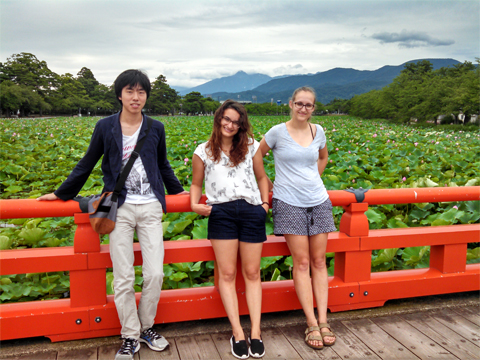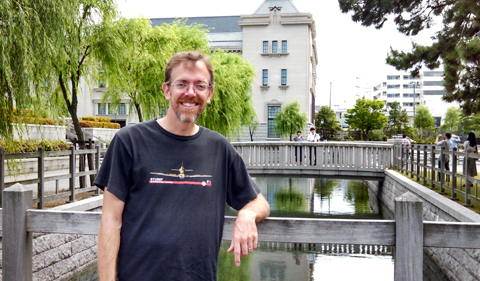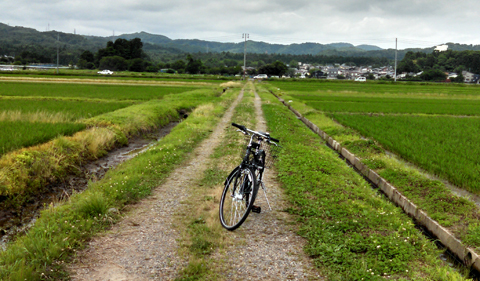By Nicole Rodriguez
In 1998, Dr. Charlie Morgan, Assistant Professor of Sociology, made his first sojourn to Joetsu Niigata, Japan, to study and interview international couples. This summer, three Ohio University undergrads went along—in part to help interview the couple’s teenage children.
In addition to getting undergraduate research and field experience, they discovered friendship, biking, and Dandy bars.
At the time Morgan began his research, he was a university student himself, and he was writing his master’s thesis on immigration in Japan through the eyes of international couples.
Three years ago, he decided to track down the people that he had spoken with 15 years ago.
“Every summer I go to Japan, and I’ve been re interviewing [these couples],” he says. “And then expanding beyond that as well. This summer we decided we wanted to [interview] the children of these international couples: the second generation.” Morgan says he thought it would be nice to have some students on the trip this time—in order to give the now teenage interviewees someone closer to them in age to talk to.
That’s when several outstanding Ohio University students come into play.
“This seemed like a super great opportunity to do research in the field with a real sociologist,” says Claire Seid, a junior Honors Tutorial College sociology major. She got interested in the trip because she was working on a sociology research methods tutorial with Morgan at the time.
Abby Stephens, also a junior HTC sociology major, says she got interested in going on the trip during a conversation with Morgan, who is her adviser.
“We just got talking… and he told me more about his research. I’ve always been interested in Japan and Japanese culture, so that’s pretty much why,” she says, adding as she looks at the student to her right, “also to bother Reiju.” They all chuckle.
“We’ve been doing this research for about a year now before we went on the trip,” says Reiju Nemoto, a senior civil engineering major. “I’ve been transcribing all these interviews… from 1998 and some from 2013.” Nemoto is an especially crucial member of this research team as one of the only undergrads at OHIO who is bilingual in English and Japanese. He has been transcribing the Japanese interviews for Morgan.
“He was literally the only guy on campus that could do this job,” Morgan says.
Nemoto was interested in learning more about the individuals he had been listening to and transcribing for so long. “I just wanted to know ‘Who were these people personally?’ Because you can listen to it, but you can’t get the full story from just what they say. I wanted to know where they lived, what kind of lives they lead.”
Finally there is Ami Scherson, who did not travel to Japan but has been brought onto the project to help Nemoto transcribe this year. She is also bilingual and is a freshman HTC music major who is deeply interested in bicultural identity. “I heard from (HTC Associate Dean) Cary Frith, and she was telling me about this cool research going on,” says Scherson, “so I just emailed Dr. Morgan.”
Preparing for the Trip
The gears have been turning on this trip for over a year now. In order to prepare, Stephens says they did a lot of literature review on Morgan’s previous work.
“We would listen to it and analyze it,” adds Nemoto. Both of them also helped Morgan with writing a paper on the previous interviews.
In order to fund the trip, Seid and Stephens applied for the Student Enhancement Award through the university. The application required their submission of a mini literature review, the purpose of their trip, a budget, and an estimated timeline of when their findings would be published.
“It really wasn’t that difficult for the amount that we received,” Stephens says. The award covered airfare, food, and most of their lodging. Morgan covered the rest with his Baker award, which he received from the university two years prior and has been using to pay Stephens, Nemoto, and Seid for their work writing papers and transcribing.
“[The university] encourages something like this because it’s usually grad students that win these student enhancement awards, so for undergrads to be able to go and do research, I think they’re really excited,” Morgan says.
Research
Morgan and the students spent 17 days total in the field—and got to do some sightseeing. Over the course of the trip, they conducted 24 in-depth interviews: some as a group and some separately and simultaneously.
“I think that’s a very good learning experience,” says Nemoto. “Just getting the field experience with a professor, and then by yourself.”
“Personally, I think it was really awesome just to travel to a different country and to talk to people whose lives were completely different from my own,” adds Stephens. “Just to see some of the strength and resolution of some of our interviewees was really spectacular. I was surprised given the political and historical issues that came up with some of the relationships in the adults… they were sort of independent of the children’s sense of self and identity, which to me is a really interesting phenomenon.”
“By and large… the kids seemed to be pretty adjusted,” Seid says.
Life in Joetsu
Morgan and the students spent their days of fieldwork in the small city of Joetsu.
“[Joestu is] a nice micro-chasm of how immigration looks overall in Japan because you have the rural aspect and the Western [influences], so you get a little bit of everything,” Morgan says.
“Because the international community as a whole is fairly small, you get all of these different nationalities,” adds Nemoto, who found his identity as an international visitor in Japan interesting compared with the way international visitors group together in the United States, usually dividing themselves by country of origin. “You get a mix of a lot in that kind of a group.… In a small community like that in Japan, oftentimes you’re either Japanese, or you’re not.”
As for lodging, Seid and Stephens got the experience of staying with host families and fully immersing themselves in Japanese culture.
“I wanted them to stay with host families so they could get a feel of what Japanese life is like,” Morgan says.
“My host parents were supremely radical people,” Stephens says with a smile. “They were very forgiving of my… American-ness. It was a really great experience because they taught me a lot about Japanese culture and Japanese etiquette. They were really impressed that we could use chopsticks.”
Since the area of Japan in which they were staying was so rural, “we couldn’t depend on buses or trains, and renting a car was way too expensive, so we just biked all over the place,” Morgan says.
Making Memories
When asked about memories from the trip, Seid offers, “Karaoke was really fun. We all went out one night and did karaoke, and it was quite a hoot.”
“This is a testament to how much I loved the trip,” adds Stephens. “My least favorite part—which I still loved—was hiking up…“
“The darn Mt. Kasagiyama!” Seid quickly finishes the sentence. “Dr. Morgan took us to hike up this giant mountain on the hottest day of the year, and it was the hottest place in Japan!”
“I looked at the map and the weather, and I didn’t go. It was 103 that day… 90 percent humidity,” responds Nemoto.
Seid adds casually, “We couldn’t go for a little while because there was a bear, but he went away.”
“It sounds like a novel day, but it was still really fun,” Stephens reassures.
“For me, a very memorable moment was the festival,” Morgan says. “They wore traditional Japanese dress, and they had a parade going down the street doing a Japanese dance. They were part of the ‘international group’ in town, and got to dance alongside people from all over the world dressed in traditional [clothes] from around the world. This interesting bonding… that’s part of the fieldwork. You get to know them on a different [level]. Not just an interview, but you’re actually talking with them while you’re putting on your dress or practicing your dances, and we made a lot of connections that way.”
Culture Shock—and Dandy Bars
When asked about any moments of culture shock, Seid told the story of when she first landed in Japan and went on the hunt for a vegetarian dinner.
“I first had to identify which shops had food in them. That was surprisingly hard! Then I had to identify what kind of food it was, and then I had to see if it had meat in it. That was really hard, so I ended up eating salmon sashimi, which is raw salmon and rice. Not exactly what I wanted, but it was tasty,” she says.
Even though Seid had landed in Japan two weeks before the program began and was traveling alone, she didn’t know Japanese, nor did Stephens. “I really have a solid grasp on ‘sorry’ and ‘excuse me’ in Japanese,” says Seid, laughing. “It’s amazing how much you can get across by pointing and looking pitiful and inquisitive.”
“[My] difficulties were with things like small Japanese etiquette that you have to remember, like [saying] ‘ita daki mas!’ before the meal or taking off your shoes before you go tromping in your house,” adds Stephens. “There were a lot of positive culture shock experiences, like the ¥100 doughnuts and the convenience stores that sold everything that you could possibly want under the sun, and the Dandy bars!”
Everyone perks up at the mention of this frozen treat.
“The best ice cream bars that you’ve ever even imagined!” Seid gushes.
“Honestly, I’m kind of sad to be back in America knowing that that’s out in the world now,” Stephens adds.
Even though Nemoto is Japanese, he found this particular community to be different from what what he’s used to.
“Even though I can read Japanese and function in Japanese society … the thing about small towns that I have trouble with in Japan [is that] the stores there don’t have the times or the hours scheduled anywhere. In the town we were in, Wednesday is their break day, not Sunday. I was trying to go shopping and I was like, ‘everything’s closed!’” he adds.
What’s Next?
Seid and Stephens are working on transcribing the English interviews from the trip and writing a paper about the second-generation children they interviewed.
Morgan and Nemoto are working on a paper together on the couples. They are currently waiting to hear if one of their previous papers has been accepted for publication.
The team hopes to submit papers to more publications and to present at the American Sociological Association annual meeting next August. According to Morgan, having the experience of being published and presenting papers is a unique and beneficial experience. “I think it makes [you] a much stronger applicant for law school. This is something you put on your resume to say you’ve done research,” he says.
“People don’t really get publication and this much research experience in undergrad,” Seid adds.
“I think one of the biggest benefits is that all of this is under the umbrella of immigration, so we’re trying to determine exactly how our world is changing,” Stephens says. “Japan as a society is rapidly senescing, and since it’s an industrialized society, it provides a decent model of how countries like the United States, Germany, or Italy might start to deal with the issue of populations with a large proportion of elderly people. We’re trying to determine whether immigration and international relations might be a solution to that.”
Get Involved in Undergraduate Research
For any undergrads out there who are looking to get this kind of research experience, there are more opportunities at Ohio University than meets the eye if you know where to look.
“Don’t be afraid to reach out to professors in the department and just talk to them,” Stephens says. “It’s not an impossible thing to find a professor with whom you have an interest in common. If they’re doing research they may very well ask you to be a part of what they’re doing.”
Scherson chimes in as the newest and youngest member of the research team: “I can say this personally. If you’re interested in the topic, email the professor. You learn a lot from it.”
“Even if it’s not your field of study,” adds Nemoto.
Morgan has been consistently impressed with the work of his students, who are not only gaining field experience, but also lightening the workload on him. “It’s helpful for me because… I just physically don’t have time to do stuff like transcription work,” he says. “I think it’s a win-win for them because they get to have that kind of experience, and it’s also paid. I feel extremely lucky and blessed to have such talented people working with me, and undergrads to boot.”






















Comments